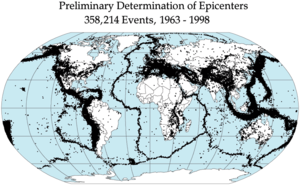 Image via Wikipedia
Image via WikipediaGlobal earthquake epicenters, 1963 1998
Up Earth
Articles general
- Aftershock - "An aftershock is a smaller earthquake that occurs after a previous large earthquake, in the same area of the main shock." - Wikipedia
- Earthquake - "An earthquake (also known as a quake, tremor or temblor) is the result of a sudden release of energy in the Earth's crust that creates seismic waves." - Wikipedia
- Fault (geology) - "In geology, a fault is a planar fracture or discontinuity in a volume of rock, across which there has been significant displacement. Large faults within the Earth's crust result from the action of tectonic forces. Energy release associated with rapid movement on active faults is the cause of most earthquakes..." - Wikipedia
- Lists of earthquakes - Wikipedia
- Seismology - "Seismology is the scientific study of earthquakes and the propagation of elastic waves through the Earth or through other planet-like bodies. The field also includes studies of earthquake effects, such as tsunamis as well as diverse seismic sources such as volcanic, tectonic, oceanic, atmospheric, and artificial processes (such as explosions)." - Wikipedia
- Time-Lapse Animation Shows Japan's Earthquakes - Discovery News - video - March 15, 2011
- More Dramatic Video from the Earthquake and Tsunami in Japan (VIDEOS) - March 11, 2011
- Understanding earthquakes And tsunamis - knoxnews.com - March 11, 2011
- How does an Earthquake in Japan cause a Tsunami in Hawaii? - Physics Buzz blog - March 11, 2011
- Japan earthquake and tsunami: what happened and why - "The key questions on the Japanese quake answered" - guardian.co.uk - March 11, 2011
- Piers Corbyn: Massive Japan Earthquake & Tsunami Were Triggered by Solar Action - video - March 11, 2011
- Solar Activity and Earthquakes - "... it cannot be said that there is a relationship between solar or geomagnetic activity and earthquake frequency and magnitude.." - some graphs of correlations between solar activity and earthquakes
- Seismic Science: Is number of earthquakes on the rise? - Interview with Dr. Michael Blanpied, associate program coordinator for the USGS Earthquake Hazards Program - "A lot of people wonder if the rate of earthquakes is increasing, but it does not appear to be." - The Washington Post - March 9, 2010
- Are Earthquakes Really Increasing? - "So is the number of earthquakes increasing? According to the United States Geological Survey, no." - AccuWeather.com - March 9, 2010
- Research topics: Earthquake - Playlist
- Images of historical earthquakes
- Latest Earthquakes in the World - Past 7 days
- Virtual earthquake - "Virtual Earthquake is an interactive Web-based activity designed to introduce you to the concepts of how an earthquake EPICENTER is located and how the RICHTER MAGNITUDE of an earthquake is determined."


No comments:
Post a Comment